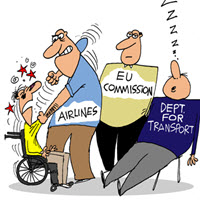DfT Window Dressing Disability Rights?
- Written by Roberto Castiglioni
 On July 17th the Department for Transport published the Aviation Passenger Charter, a legally non-binding document that details the rights of passengers traveling by air, including additional rights for persons with disabilities.
On July 17th the Department for Transport published the Aviation Passenger Charter, a legally non-binding document that details the rights of passengers traveling by air, including additional rights for persons with disabilities.
This charter outlines when airlines must compensate passengers if their flight is canceled or delayed for more than three hours. But when it comes to the rights of disabled passengers during their journey, the Charter appears to be more of an exercise in window-dressing than a true commitment.
The paper explains that disabled passengers and those with reduced mobility are legally entitled to special assistance from the airport's arrival point to the aircraft's departure point. The Charter also mentioned that passengers are able to request help in order to move through the airport, board the aircraft and get into their seat, as well as receive assistance during the flight. Passengers can also rely on help when getting off the aircraft and when transferring between flights.
The paper is clear that people with disabilities are legally entitled to these services, but what happens if something goes wrong?
The Charter explains the complaint process in detail, but also mentions that the U.K. Civil Aviation Authority “does not have legal powers, so any decision they make on the outcome of your complaint is not binding on the airport or airline.”
What the law says
Article 16 of the anti-discrimination framework EC1107/2006 states that “The Member States shall lay down rules on penalties applicable to infringements of this Regulation and shall take all the measures necessary to ensure that those rules are implemented. The penalties provided for must be effective, proportionate, and dissuasive.”
The law came into force on 26th July 2008, but there are currently no penalties in place. Furthermore, the National Enforcement Body of the Regulation, the Civil Aviation Authority, does not have the power to issue any penalties for infringements.
What is the government doing about the CAA's enforcement powers?
In its summary of responses to the Aviation 2050 consultation, chapter 5: Enhance the Passenger Experience, The Dft mentioned the consideration of whether the CAA should have additional powers if enforcement is needed for breaches of consumer rights. However, the paper states that “these issues will be considered further outside of the Charter.”
The government's approach to this issue is quite worrying. Article 16 uses the word "shall." In law, "shall" is used to indicate a requirement that is contractually binding, meaning it must be implemented and its implementation verified. Giving enforcement powers to the U.K. CAA is not a matter for consultation or consideration; it is a legally binding action. It's hard to believe that 14 years after this legal framework came into force, the government has yet to implement it.
What powers does the Civil Aviation Authority currently have?
The Civil Aviation Authority is different from other government departments in that they have fewer legal tools. They have very limited options to enforce infringement of disability rights and must rely heavily on the public's awareness by only publishing the Airport Accessibility Report once per year.
While they have the power to take airports or airlines to court, there is little to no case law when it comes to EC1107/2006, making the outcome of any proceeding unpredictable. There is also the monetary aspect of legal action, as proceedings can be extremely expensive.
However, the one that has proven most effective for them is known as Legal Undertaking. Within this legally binding framework, the airport undertakes to develop a performance improvement plan that will help ensure that it is able to provide a high-quality, consistent service to disabled persons. The Civil Aviation Authority is tasked with ensuring that the airport is fully compliant with all of the agreements laid out by the two parties. If any one of these agreements is not met by the airport, the CAA undertakes legal action against the airport.
What needs to happen now
Violations of the rights of disabled people traveling by air are an everyday occurrence in headlines. The violations can range from a lack of wheelchair assistance, even when pre-booked, to an inability to provide proper seating arrangements and everything in between.
As of September, whoever will be the Secretary for Transport must comply with Article 16 and give the UK Civil Aviation Authority the power to issue penalties for infringements of EC1107/2006 without any further dithering or delay. Failure to execute Article 16 will most likely trigger a judicial review.










